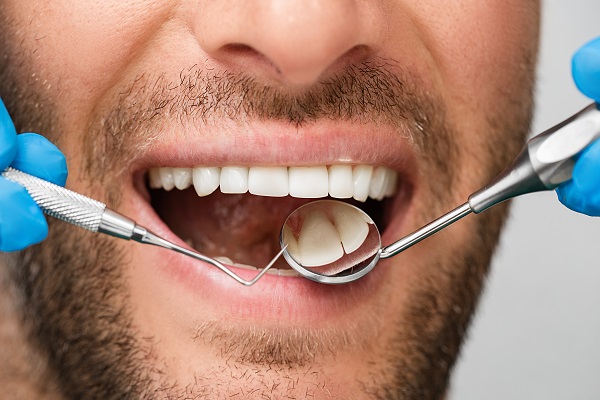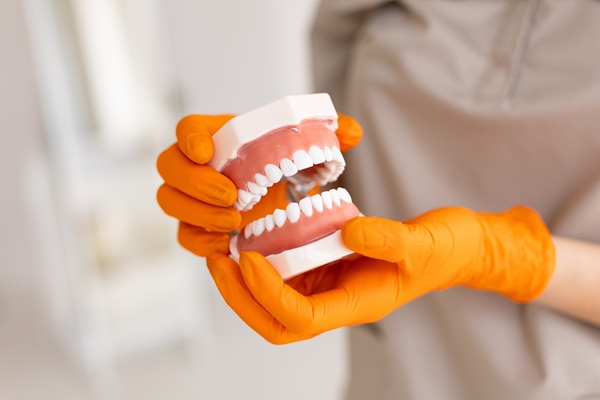How Is Gum Disease Treated?

Gum disease is a bacterial infection that causes inflammation in the gums and bone surrounding the teeth. The resulting inflammation causes bone loss and eventually, tooth loss, and it can contribute to other health problems. Once a patient has been diagnosed with gum disease (periodontal disease), prompt treatment is necessary to address the condition. Most treatments for gum disease include non-surgical techniques in the early stages; however, surgical procedures are often necessary for the advanced stages.
Stages of gum disease
There are non-surgical and surgical treatment options for gum disease, depending on the severity of the illness, the condition of the gums and teeth, and the patient’s general well-being. Periodontitis is preceded by gingivitis, which is gum inflammation. Periodontitis refers to gum infection and the loss of tissue or bone.
Gingivitis is when the gums become inflamed and red due to an accumulation of bacterial plaque on the teeth. Brushing may cause the teeth to bleed. The teeth are not loose, but the gums are inflamed and painful. There is not yet visible damage to the bone and surrounding tissue. Periodontitis may develop if gingivitis is left untreated.
Periodontitis is a condition in which the gums and bone supporting the teeth begin to recede. The bacterial debris that accumulates between the teeth and gums eventually causes infection. As the plaque moves into the pockets below the gum line, the immune system begins to combat the bacteria. The toxins, byproducts of the bacteria’s metabolism, begin to degrade the bone and connective tissue that support the teeth’s structure. Teeth may fall out if they become loose in their sockets. Irreversible modifications may occur.
The dental professional can diagnose gum disease via a physical exam and the observation of symptoms. The physical exam entails using a periodontal probe to check the gum pockets around the tooth. When a tooth is in good health, the probe should not go past the gum line. In patients with periodontitis, the probe will go deeper beneath the gum line. The pocket’s depth shows the extent of the disease. Dentists can also use X-rays to check the health of the jawbone and teeth.
Gum disease treatment
Periodontal treatment is necessary to halt or reverse the progress of gum disease. The treatments include the following.
Scaling and root planing
Scaling and root planing is a conservative, non-surgical gum disease treatment. The general dentist performs this procedure by scraping and cleaning plaque and tartar from the teeth and root surfaces using special equipment. The rough surfaces on the tooth’s roots will be smoothed to prevent bacteria from re-accumulating. This process may require multiple visits.
The dentist will administer a local anesthetic to alleviate any pain. The gums will heal and reconnect to the healthy, clean surfaces of the teeth after this procedure. The dentist will assess the patient’s recovery after a few weeks and determine if additional treatment is required.
Pocket reduction procedure
In the case of more advanced periodontitis, the treatment will be about making the teeth and gums clean again and restoring loose teeth caused by gum disease. Patients will find it harder to maintain proper cleanliness of deep gum pocket regions if the gum tissue does not fit tightly around the tooth after scaling and root planing. In this case, the dentist will recommend a periodontal pocket reduction or flap surgery. During the procedure, the dental professional will remove pathogenic microorganisms and smooth out regions of damaged bone after folding back the gum tissue. After that, the gum tissue will reconnect to healthy bone.
Gum grafts
Gum grafts cover exposed roots caused by gum recession resulting from gum disease. Tissue material from the palate or another source is used to cover the roots of one or more teeth. Gum grafting helps minimize sensitivity, prevent bacteria attacks on the roots, and prevent additional gum recession and bone loss.
Laser therapy
Lasers have transformed several meidcal sectors, including dental care. Even though laser periodontal treatment is still in its early stages, it has been shown to be effective in certain patients. There are a few advantages of this innovative treatment, including the laser’s capacity to precisely target the disease, as well as being less intrusive and having a quicker recovery period.
The bottom line
Gum disease is a major dental health problem that may lead to tooth loss and other oral health problems. It is essential to have regular dental checkups and examinations and to have gum disease treated as soon as possible for oral health reasons and general well-being. Contact the dentist now if you are experiencing any of the signs of gum disease or if you need to schedule a basic dental checkup and cleaning.
Request an appointment here: https://stellarsmilesinc.com or call Stellar Smiles at (561) 225-2070 for an appointment in our Boca Raton office.
Check out what others are saying about our dental services on Yelp: Gum Disease in Boca Raton, FL.
Recent Posts
Most people have experienced seeing red on the bristles of their toothbrush, or a pink tint in the sink when they expectorate after brushing. It is normal to feel a bit of concern when noticing blood in the mouth because bleeding gums are a symptom commonly associated with gum disease. However, while chronic bleeding gums…
Gum recession is a type of dental issue that can happen to anyone for several reasons. The problem arises when the gum tissue along the gum line starts receding. This can cause your smile not to appear as healthy as it once was. For some people, this can be an uncomfortable condition and may even…
According to our preventive dentist and the American Dental Association, the answer to that question is every six months for most people. That is the maximum amount of time you should have between dental visits since it ensures your dentist can detect any developing problems before they cause significant damage to the structures inside your…
Considering choosing implant supported dentures as your new denture choice? There are many different types of dentures you can choose from nowadays, making it a good idea for you to understand how each type works so you can make a choice that is right for you and your lifestyleLearning what implant supported dentures are and…



